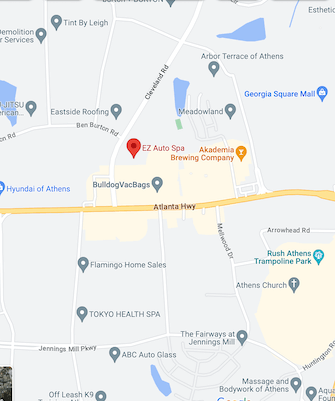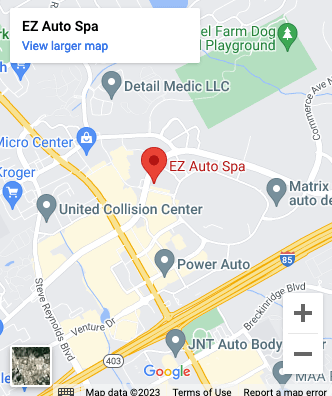Toyota 4Runner Dent Repair, Ceramic Coating & PPF
Your Toyota 4Runner represents the perfect blend of rugged capability and refined engineering – but keeping it looking showroom-fresh requires more than regular washing. Whether you’re navigating Georgia’s backcountry trails or cruising through Atlanta’s urban landscape, your 4Runner faces daily challenges that can impact its appearance and resale value.
At EZ Auto Spa, we understand what makes Toyota 4Runner owners tick. You’ve invested in a vehicle that’s built to last, and you deserve protection services that match that quality. Our specialized paintless dent repair, ceramic coating, and paint protection film services are specifically designed to preserve your 4Runner’s iconic looks while enhancing its durability.
From our Georgia location, we’ve helped countless 4Runner enthusiasts nationwide maintain their vehicle’s pristine condition. These three essential services work together to shield your investment from road debris, UV damage, and minor impacts – ensuring your 4Runner stays adventure-ready while looking its absolute best.
Serving Atlanta + Athens
EZ Auto Spa has two locations conveniently located to serve the Metro Atlanta & Metro Athens area. We serve a wide geographic area and can work with your schedule to make your service happen.
Open Weekdays from
8:30-5:00
Call to ask any question
706-971-7867
Understanding Paintless Dent Repair for Toyota 4Runner
Toyota 4Runner paintless dent repair eliminates minor dings without affecting the original factory paint. This specialized technique preserves your vehicle’s warranty and maintains its authentic finish integrity.
What Makes Toyota 4Runner Bodies Ideal for PDR
Toyota 4Runner steel panels respond exceptionally well to paintless dent repair techniques due to their thicker gauge construction. The SUV’s flat surface areas and accessible panel designs allow technicians to reach most dents from behind using specialized tools.
Common Dent Types That Can Be Repaired
Hail damage, door dings, minor collision impacts, and shopping cart dents repair easily on 4Runner bodies. Small creases, shallow dents up to 6 inches, and minor body line damage also qualify for successful PDR treatment.
Benefits of Ceramic Coating for Toyota 4Runner
Ceramic coating transforms your 4Runner’s paint into a protective barrier that withstands harsh conditions while maintaining showroom appearance. This advanced nanotechnology creates a permanent bond with your vehicle’s clear coat.
Protection Against Environmental Damage
Ceramic coatings shield your 4Runner from UV rays, acid rain, and road salt that typically cause paint oxidation and corrosion on off-road vehicles.
Enhanced Gloss and Easy Maintenance
Professional ceramic coating amplifies your 4Runner’s paint depth while creating hydrophobic properties that make dirt and mud wash away effortlessly during cleaning.
Paint Protection Film (PPF) for Toyota 4Runner
Paint protection film provides your Toyota 4Runner with an invisible armor against road hazards and environmental damage. Professional PPF installation creates a sacrificial layer that absorbs impacts while maintaining your vehicle’s factory finish.
High-Impact Areas That Need PPF Coverage
Your Toyota 4Runner’s front bumper, hood, fenders, and headlights receive the most rock chip damage during off-road adventures. Side mirrors, door edges, and rocker panels also require protection from trail debris and parking lot scratches.
Types of PPF Available for 4Runner
Clear PPF offers invisible protection while maintaining your 4Runner’s original appearance and color vibrancy. Self-healing films automatically eliminate minor scratches through heat activation, while standard films provide excellent impact resistance at lower cost points for budget-conscious owners.
Comparing Protection Options: Ceramic Coating vs PPF
Choosing between ceramic coating and paint protection film for your Toyota 4Runner depends on your specific protection needs and budget considerations. Both options offer distinct advantages that complement the rugged nature of your vehicle.
Cost-Benefit Analysis
Ceramic coating typically costs $800-$1,500 for professional application while PPF ranges from $2,000-$4,500 for full coverage. Ceramic coating delivers excellent value for UV protection and easy maintenance. PPF provides superior physical impact resistance despite higher upfront investment costs.
Durability and Longevity Factors
Professional ceramic coating lasts 3-5 years with proper maintenance on your 4Runner’s factory paint. Quality PPF maintains effectiveness for 7-10 years while offering self-healing properties. PPF withstands more extreme trail conditions and provides better long-term protection against rock chips.
Professional Installation vs DIY Application
Professional installation ensures optimal results for your Toyota 4Runner’s protection services. Expert technicians deliver precision that DIY kits simply can’t match.
Why Professional Installation Matters
Certified technicians possess specialized tools and environment-controlled facilities that eliminate contamination risks during application. Toyota 4Runner’s complex curves and panel configurations require precise techniques that prevent bubbling, peeling, and uneven coverage that commonly occur with DIY attempts.
What to Expect During the Process
Professional installation typically takes 1-3 days depending on services selected. Your 4Runner undergoes thorough decontamination, surface preparation, and controlled application in dust-free environments before final quality inspection and curing verification.
Maintaining Your Protected Toyota 4Runner
Your Toyota 4Runner’s protection systems require specific care techniques to maximize their lifespan and effectiveness. Proper maintenance routines preserve both ceramic coating and PPF investments while keeping your vehicle looking pristine.
Proper Washing Techniques
Use pH-neutral soap and microfiber wash mitts to clean your ceramic-coated 4Runner every 2-3 weeks. Rinse thoroughly before washing to remove loose debris that could scratch protected surfaces.
Long-Term Care Tips
Inspect PPF edges quarterly for lifting or debris accumulation around vulnerable areas. Park in shaded areas when possible to extend ceramic coating durability and maintain optimal hydrophobic properties.
Conclusion
Your Toyota 4Runner deserves the best protection available to maintain its rugged appeal and preserve its value. Whether you choose paintless dent repair for quick fixes ceramic coating for enhanced gloss or PPF for maximum impact resistance you’re making a smart investment in your vehicle’s future.
Professional installation ensures these protective solutions deliver optimal performance and longevity. With proper maintenance your 4Runner will continue looking showroom-fresh while tackling any adventure you throw at it.
Don’t wait until damage occurs – protect your investment today and enjoy years of worry-free driving in your pristine Toyota 4Runner.
Explore our posts on Toyota cars – Scion, Scion iA, Scion xB, Tesla Roadster, Toyota 4Runner, Toyota 86, Toyota Avalon, Toyota bZ4X, Toyota C-HR, Toyota Camry, Toyota Celica, Toyota Corolla, Toyota Echo, Toyota FJ Cruiser, Toyota GR Supra, Toyota GR86, Toyota Highlander, Toyota Land Cruiser, Toyota Matrix, Toyota Mirai, Toyota MR2 Spyder, Toyota Prius, Toyota RAV4, Toyota Sequoia, Toyota Sienna, Toyota Tacoma, Toyota Tundra, Toyota Venza, Toyota Yaris, Toyota Window Tinting, Toyota Ceramic Coating, Toyota Dent Repair, Toyota Paint Protection Film (PPF).
Frequently Asked Questions
What protection services does EZ Auto Spa offer for Toyota 4Runner owners?
EZ Auto Spa specializes in three main protection services for Toyota 4Runners: paintless dent repair (PDR), ceramic coating, and paint protection film (PPF). These services are designed to preserve your vehicle’s appearance, maintain its resale value, and protect against environmental damage while ensuring durability for both off-road adventures and urban driving.
How does paintless dent repair work on Toyota 4Runners?
Paintless dent repair (PDR) removes minor dings and dents without affecting the original factory paint, preserving your warranty and finish integrity. The 4Runner’s steel panels are ideal for PDR due to their thicker gauge construction. This technique effectively repairs hail damage, door dings, minor collision impacts, shopping cart dents, and shallow dents up to 6 inches.
What are the benefits of ceramic coating for my Toyota 4Runner?
Ceramic coating creates a permanent protective barrier using advanced nanotechnology that bonds with your vehicle’s clear coat. It shields against UV rays, acid rain, and road salt while preventing paint oxidation and corrosion. The coating enhances paint gloss, provides hydrophobic properties for easier cleaning, and helps maintain a showroom appearance even in harsh conditions.
Which areas of my 4Runner need paint protection film coverage?
High-impact areas requiring PPF include the front bumper, hood, fenders, and headlights, which are prone to rock chips during off-road adventures. Side mirrors, door edges, and rocker panels also need protection from trail debris and parking lot scratches. These areas face the greatest risk of damage from road hazards and environmental elements.
What’s the cost difference between ceramic coating and paint protection film?
Ceramic coating typically costs $800-$1,500 for professional application, while PPF ranges from $2,000-$4,500 for full coverage. Ceramic coating offers excellent value for UV protection and maintenance ease, whereas PPF provides superior physical impact resistance. Consider your specific protection needs and budget when choosing between these options.
How long do ceramic coating and PPF last on Toyota 4Runners?
Professional ceramic coating lasts 3-5 years with proper maintenance, while quality PPF maintains effectiveness for 7-10 years. PPF offers additional benefits like self-healing properties that eliminate minor scratches through heat activation. PPF is better suited for extreme trail conditions and provides longer-term protection against rock chips and physical damage.
Why should I choose professional installation over DIY protection products?
Professional installation ensures precision that DIY kits cannot match. Certified technicians use specialized tools in environment-controlled facilities to prevent contamination. The 4Runner’s complex curves require precise techniques to avoid bubbling, peeling, and uneven coverage common with DIY attempts. Professional installation takes 1-3 days with thorough quality inspection.
How should I maintain my 4Runner’s ceramic coating and PPF?
Use pH-neutral soap and microfiber wash mitts every 2-3 weeks for proper cleaning. Inspect PPF edges quarterly for lifting or debris accumulation. Park in shaded areas when possible to extend ceramic coating durability and maintain hydrophobic properties. Following specific care techniques maximizes the lifespan and effectiveness of both protection systems.
Serving Atlanta + Athens
EZ Auto Spa has two locations conveniently located to serve the Metro Atlanta & Metro Athens area. We serve a wide geographic area and can work with your schedule to make your service happen.
Open Weekdays from
8:30-5:00
Call to ask any question




